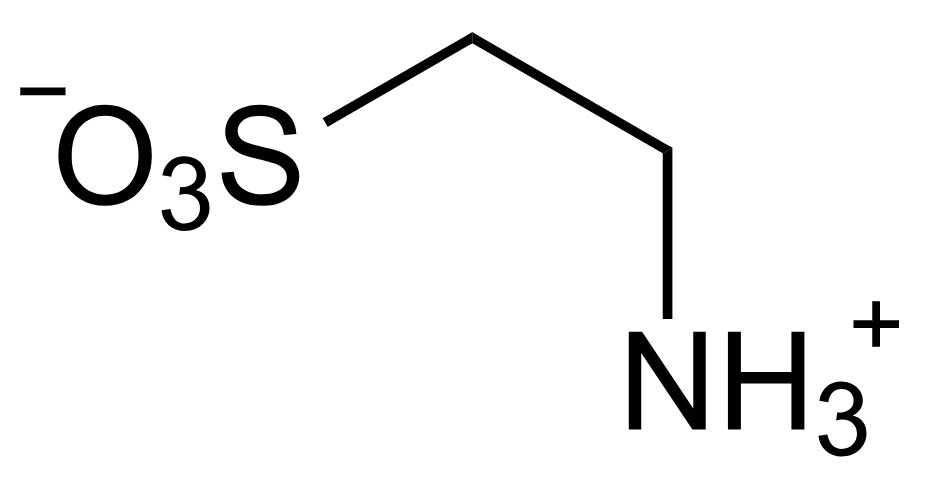The Potential Health Benefits of Taurine

Taurine is an amino acid, although unlike other common amino acids, it’s not used to build proteins. While it’s often encountered in energy drinks, it’s also present in seafood, eggs and meat (Wójcik 2010).
In the body, taurine has several functions. Primarily, it is combined with cholesterol in the liver making it into a water soluble bile acid that is released from the gallbladder to help with fat digestion and absorption (Wójcik 2010). Taurine is also needed for proper heart function. Taurine deficiency has been shown to cause a pathological enlargement of the heart that can be reversed with taurine supplementation (Schaffer 2010). These heart effects appear to be due to taurine’s ability to enhance the function of calcium, a mineral vital for heart muscle activity. Taurine also acts as an antioxidant. In the brain, taurine plays a role as an inhibitory neurotransmitter, slowing down brain activity (Ochoa de la Paz 2019).
Practically speaking, taurine supplementation has been shown to have a number of potential benefits, including effects on:
- Heart function
- Brain health
- Muscle cramps
- Longevity
Heart Benefits of Taurine
A meta-analysis of the research found that taurine lowers blood pressure, cholesterol and triglycerides—a type of fat found in the blood that can contribute to heart disease (Guan 2020). The same study also found that taurine supplementation has a modest impact on weight loss, just one pound (½ kilogram) on average.
Research also suggests that taurine improves heart function in patients with heart failure (McCarty 2021). In addition, the amino acid appears to be useful for stabilizing heart rhythms (Ardarneova 2018).
Brain Benefits of Taurine
While most of the research is preliminary and often involves only a few studies for each indication, overall, the literature suggests that taurine may have general benefits for brain health. The benefits appear to extend to a number of diverse brain-health conditions.
Dementia
A one-month study on taurine supplementation in women with dementia found small but significant improvements in mental function (Bae 2019). Research in animal models also appear to confirm that taurine is helpful for treating Alzheimer’s disease and dementia (Huf 2023, Ahmed 2024).
Delirium
Delirium is a state characterized by profound confusion due to a number of different underlying medical conditions that can affect brain function. It is associated with worse outcomes and an increased risk of death. In patients undergoing liver transplantation, delirium is a common occurrence. In a study of liver transplant patients, taurine dramatically reduced the incidence of delirium to 9% as compared to 35% in the placebo group (Mottaghi 2022).
Psychosis
Psychotic episodes are often a precursor to schizophrenia and long-term mental health consequences. In first-episode psychosis, taurine supplementation was found to significantly improve symptoms, including levels of depression and overall functioning (O’Donnell 2016).
Studying

In college students, taurine supplementation was shown to significantly improve self-regulatory learning (Park 2022). Self-regulatory learning is the process of learning materials on your own time at your own pace.
Tics
Tics are a problem with sudden involuntary muscle movements or vocalizations that an individual can’t control. Taurine, due to its inhibitory neurotransmitter effects, was given to individuals struggling with tics. As a supplement, it reduced tics more effectively than placebo without notable side effects (Ding 2020).
Other Potential Indications
Muscle Cramps
A couple of studies have explored whether or not taurine can be helpful for treating muscle cramps in patients with liver disease. One study found 3.5 fewer cramps per week with taurine (Vidot 2018). This reduction decreased the weekly duration of muscle cramping episodes by a total of 45 minutes.
A small pilot study also purported to find benefits with taurine for muscle cramps in liver disease (Jang 2020). The study found that seven out of ten patients improved with taurine supplementation.
Longevity
While the research in humans is not yet conclusive, studies in both mice and monkeys found that taurine supplementation extends lifespan (Singh 2023). In the study, supplementation of taurine extended the total lifespan of the animals by around 11%.
Conclusion
Taurine is an interesting amino acid with a number of different potential health benefits. Most of the evidence supports effects on improving heart and brain function, with minimal side effects. Hopefully, with more research, we can get a better understanding of when and how to use taurine to maximize its potential benefits.



